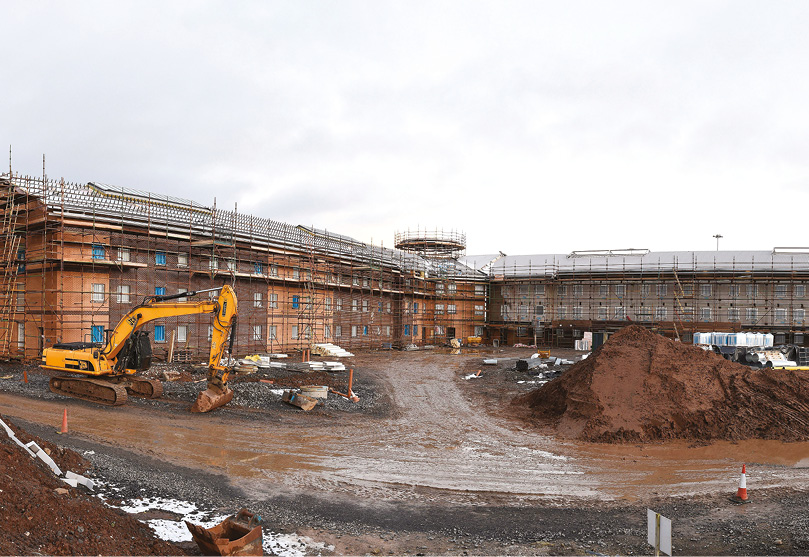Prisons 2020

agendaNi’s David Whelan talks to head of the Northern Ireland Prison Service Ronnie Armour on completion of his first year in the role and discusses his vision for Prisons 2020, a programme of continuous improvement.
The prison service in Northern Ireland has undergone significant reform since the devolution of policing and justice in 2010. By 2016, the ministerial group overseeing the clear pathway for urgent structural, operational and cultural change reported that 90 per cent of recommendations had been delivered or signed off. However, Head of the Northern Ireland Prison Service (NIPS) Ronnie Armour has warned against complacency.
“The prison service in Northern Ireland is on a journey and while I think excellent progress has been made to date, there is still some way to go.”
Armour took up the post as Director General in February 2017 and holds dual responsibility as Director of Reducing Offending, as well as responsibility of the prison service. One of his first actions was to commission a programme for improvement, building on the progress that has went before him.
Currently out for consultation, Prisons 2020 is a programme of improved delivery of rehabilitation and reoffending reduction, driven by the creation of the citizen-focused draft Programme for Government and in particular, by Outcome 7, which focuses on the importance of having a safe community where we respect the law and each other.
“It is essential that we hold those in our care safely and securely but it is equally important that we make the community safer by supporting people to change their behaviours as we focus on rehabilitation, resettlement and reintegration into society,” he says.
“It is therefore important that we have clear and agreed strategic priorities that ensure our focus on continuous improvement is centred on working with individuals to reduce the likelihood of them reoffending.”
Prisons 2020 consists of four strands of improvement:
• people
• services
• infrastructure; and
• partnerships.
Armour points out that the programme of improvement is starting from a solid foundation based on recent reports on Northern Ireland’s three operational prisons. “Hydebank Wood received a positive report from the criminal justice inspectorate in 2016 and is now a secure college, the first of its kind on these islands. HM Prison Magilligan received an excellent report published prior to Christmas 2017 and Maghaberry had an interim inspection in 2017 that was very positive about the leadership, the stability and the progress that is being made.”
“I think it is important that we invest in our staff in terms of the training we offer them given the complexity of their role.”
People
The people strand of Prisons 2020 seeks to harness and develop the talents of staff to create an environment that encourages high performance and supports staff development.
Armour describes the prison service as a “a public service conducted in private” and recognises a disconnect between the role of prison staff and the public perception.
“People in the broader community don’t really have a perception of the job prison officers do. Prison officers do a very demanding job, dealing with some of the most complex and challenging behaviours in society. They are counsellors, supporters and role models.
“I think it is important that we invest in our staff in terms of the training we offer them given the complexity of their role.”
Prisons 2020 outlines plans for a fundamental review of training, ensuring staff are equipped with the capability to not only hold people “securely, decently and safely”, but also to work with individuals to address offending behaviour and support them to change in a range of areas.
“As well as equipping our staff with the correct training, I also feel it is important that we recognise and value the work that they do and celebrate the successes they have in making a significant difference to peoples’ lives.”
One area in which Armour is actively seeking to make changes is in that of staff diversity. Historically the profession has been dominated by Protestant males, Armour says that NIPS is consistently seeking to better reflect the makeup of society within staffing. “Diversity is still an issue for us and one we are actively working to overcome. In recent times, we have seen the number of females within the organisation increase and we have seen the number of people from under-represented parts of the community increase as well, although not to the extent that we would like. There is work for us to do here and we want to do that through schools, sporting organisations and with our local political parties to encourage better representation across the Service.”
“What we aim to achieve is responsible, skilled and resilient citizens, who are employable when they leave our care and who can integrate back into the community from whence they came and make a positive contribution.”
Services
Linked in to the support prison personnel are providing to encourage rehabilitation are the services being offered in prisons, focused on restoring an individual to normal life after a period of imprisonment.
Armour explains that Prisons 2020 seeks to build on the person-centred approach which prisons have been utilising to good effect. “An important element of our services is to provide, as far as possible, services tailored towards the need of the individual. Currently we configure a prisoner needs profile and evolve this into a prisoner development plan.
“We aim to put a greater focus on pathways to resettlement and one of the recent steps we have taken was the outsourcing of our learning and skills to Belfast Met and the North West Regional College, which has greatly broadened the range of subjects and training being provided.”
Armour outlines that prisoner health and wellbeing is another crucial pathway to ensuring successful rehabilitation and resettlement. A key challenge facing most prisons across the world is the prevalence of drug abuse and misuse.
“I would contend that there are no prisons who do not have the problem of drug misuse,” he states. “Our current strategy is around restricting the supply of drugs into our prisons but we also have a focus on supporting people with addiction issues to come off drugs and turn their life around. We are fundamentally looking at all the services we provide because it’s important in terms of the interventions we are making that they are tailored and appropriate. We are doing this in partnership with a range of other organisations.
“What we aim to achieve is responsible, skilled and resilient citizens, who are employable when they leave our care and who can integrate back into the community from whence they came and make a positive contribution.”
Armour expresses that in order to achieve this there is work to be done in improving community perceptions of prisoners and ex-prisoners. “It is not a surprise to highlight that a prisoner, who upon release has no connection to the community they are in, no family relationships, no job or no house, is more likely to recommit crime. What Prison 2020 outlines is a desire to strengthen those relationships in the community with the likes of local businesses and housing associations. We believe that a smooth ‘through the gate’ transition will contribute to their rehabilitation and resettlement.
“To date, this work has been successful and we see room for improvement but we can’t overlook the fact that we are dealing in a prison context with some of the most challenging people in society. Placing these people back in to the community and supporting them while they are there is a difficult job. However, it is vitally important that we, along with our colleagues in the Probation Service and voluntary organisations, are working hand in hand to adequately support people as they move out of the system.”
Partnerships
Armour has stressed his desire for greater collaboration between the prison service and their respective partners. One vision Prisons 2020 outlines for this is the creation of a partnership forum geared at delivering better public services.
“While I’m encouraged by the good work being done within prisons by outside organisations, we need to ensure that we are effectively collaborating to ensure we are delivering the best outcomes for people in our care. We will establish and create a forum which brings our partners together to analyse how we can best deliver in the context of the Programme for Government outcomes. We want to ensure that we are getting the best value for the investment of money and time that we are collectively all putting in.”
“There is no question that we are dealing with some people within the prison system that we are not skilled to treat.”
Infrastructure
Better use of resources is something that is constantly at the forefront of Armour’s thoughts. Since 2010, the NIPS has been required to deliver savings of 24 per cent with further public service cuts in the pipeline. Improving, or even maintaining, current prison infrastructure has therefore been a challenge. Armour is in no doubt that elements of the prison service’s physical estate have aged beyond use but is confident that the necessary improvements are being prioritised.
Describing the development of a new 360-block accommodation building under way at Maghaberry as a “game changer”, he adds: “The new block, digitally equipped and built to the highest specification in terms of standards, will be a cornerstone of our bid to improve services we deliver at Maghaberry and will fundamentally change how we do our business along with the three-prison model envisaged by the Owers Review Team.” A longer-term vision for Maghaberry includes the provision for a new visits area and a new high security facility.
At Hydebank Wood, a prison criticised for housing its female population along with its young males, Armour points to “advanced stage” development plans at creating a separate facility on the site for females, but within the footprint of Hydebank Wood.
Armour has publicly dismissed recent media reports that Magilligan prison, a site previously earmarked for redevelopment, could close. “I am committed to Magilligan and committed to a prison service footprint on that site,” he said. “As part of Prisons 2020 we have been refining our plans as to how we can replace the existing infrastructure. However, I don’t believe the funding will be available for a completely new prison to be built in the short-term.
“One option we have examined is to build a new 240-block there and replace the prison incrementally around that. It’s important to note that the service being delivered at Magilligan is excellent, despite the poor infrastructure.
“I passionately believe that those delivering the first-class services deserve facilities that will enable them to continue the good work that they are doing and we are actively seeking the funding necessary to begin implementing our infrastructure plans.”
Mental health
Aside from financial resources, another major challenge facing the NIPS is the long-standing mental health problems amongst prisoners and the capacity of prisons to treat those problems.
Armour believes that the prison service, along with their colleagues in the South Eastern Health and Social Care Trust, who have responsibility for healthcare in the prisons, are doing the best job they can, but admits he shares the concerns.
“There is no question that we are dealing with some people within the prison system that we are not skilled to treat. People with personality disorders, for example, who are not covered by the Northern Ireland Mental Health Order. We are doing our best for these people but we are not skilled or equipped to offer the appropriate care. What we have done is put a lot of resources into ensuring the safety of those vulnerable individuals but undoubtedly there are some inmates who would be better treated elsewhere. Unfortunately, there isn’t that facility in Northern Ireland at the minute and the prison service are dealing with the fallout from that.
Future
Looking to the future Armour explains that the advancements of digital technology is an area in which he sees potential for the improvement of prison standards and the effectiveness of prison services. He sets out ambitions for the NIPS to be an exemplar for good practice to other prison services across Europe. “I think the recent inspection reports show that we are moving in the right direction,” he concludes.
Profile: Ronnie Armour
 A civil servant since 1983, Armour has held a number of senior roles prior to his appointment as Director General in February 2017 including as Chief Executive of the Compensation Agency and more recently as Chief Executive of the Northern Ireland Courts and Tribunals Service.
A civil servant since 1983, Armour has held a number of senior roles prior to his appointment as Director General in February 2017 including as Chief Executive of the Compensation Agency and more recently as Chief Executive of the Northern Ireland Courts and Tribunals Service.








